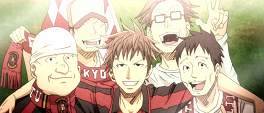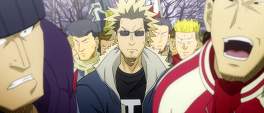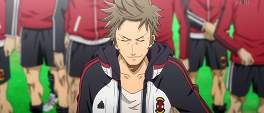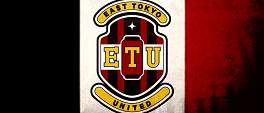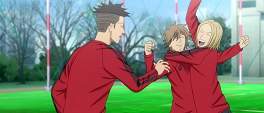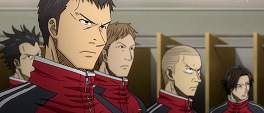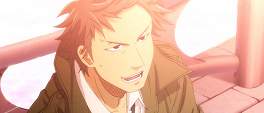Capturing the spirit of football and not simply throwing angry young men together is a tough ask, whether Giant Killing achieves it is a question best left for an audience more familiar with the enthusiasm the sport engenders. The first three episodes certainly capture the fury and, one presumes, the passion it stems from but whether the series can transcend its relegation to the sports genre is another matter. With only a single match and a lot of shouting in the opening episodes it has a long way to go to individuate itself from others in its league but converting an audience ambivalent or indifferent to football is perhaps too much to ask.
East Tokyo United (ETU) isn't doing well: after years of poor performance after their star player Takeshi Tatsumi departed, they've had to turn to their last resort. A renowned manager is hired to drag the team out of their slump; the manager however is the same player who abandoned the team and caused their rapid descent down the leagues. His style is unorthodox and destructive, riling up the experienced players by claiming that the group of younger players is in the best position to make the first team. After an abrasive and revelatory training session, the team heads out to their training camp in the frigid north where the whimsical Takeshi is doing everything he can to fracture the team. Whether the techniques his time in England fostered will transfer over to ETU will define whether they'll beat their rival, Tokyo Victory, and prove they are in fact capable of giant killing.
It was always going to be a tough sell; despite the years of effort spent integrating football into Japan, it will always come second to baseball and remain a stoically British export. The first three episodes of the series do little to dissuade this thinking - the constant shouting and punk styling of ETU's supporters are more than inspired by the sport's infamous hooligans while the sporadic sojourns into Takeshi's time in England are peppered with slow but surprisingly competent English. Where the series begins to diverge from football stereotypes is in the work ethic applied to the resurrection of the team - single minded and utterly focused. None of the cast exist outside of their job, home lives are saved for the fans while the professional sports players are made to train without respite lest some outside influence derail their quest.
This approach leads the players to by and large be two dimensional, and although they are easily differentiated by hairstyle, their personalities blend into a cacophony of bellowing obscenities, arrogance and obnoxiousness. It is somewhat of a relief that Takeshi is a man of few words but disappointing that his football savant character, for now at least, seems to be based on Holland from Eureka Seven. His approach to managing the team is controversial within the confines of the series, however it is an all too familiar strategy and the meteoric rise of the team is ensured, as is the internal strife that will hamper their efforts and the possibility of subversive manoeuvring from their competitors. The worry is that the show will be too predictable and there isn't enough to separate it from the myriad other identical underdog stories - football could easily be swapped out for any other team-based sport. The second episode shows the most promise by delving into Murakoshi's motives for sticking with the flagging team, but even this is handled hamfistedly with an extended monologue and barely animated flashbacks.
If Giant Killing was able to show a different aspect of football or even craft a compelling story then it would be a much easier sell to an audience disinterested in the most beautiful game. Instead the first three episodes show an uninspired and predictable series with bland characters and a penchant for mistaking enthusiasm and devotion for shouting and confrontation. Coming from a relatively inexperienced director this is not a surprise and although Studio DEEN stalwart Toshifumi Kawase is on board, the source material likely allows little else. The audio is as mixed as the production staff with a bizarre Irish-tinged opening track and crowd-stomping ending but a completely forgettable main score; the voice actors are anything but mixed though with Tomokazu Seki taking the lead role and Daisuke Ono as support, both offering some much needed balance to the other members of the team.
In aggregate the opening to the series comes out as above average, but it's plain to see where it is heading and how it will develop meaning that even for football fans, this demonstrates all the hallmarks of a time waster.

